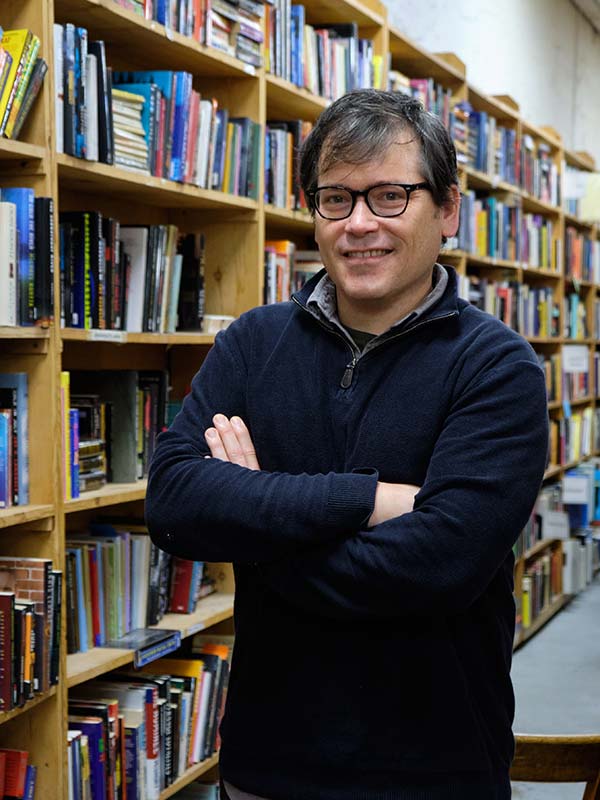Jason Skipper was a first-generation college student whose picture of college life was a snapshot of what he saw in movies – all party and little work, characters that crammed an all-nighter and aced the big tests.
“I mainly went to college to form a band, drop out of school, and go on the road with the intent to go back to school later to study filmmaking,” Skipper said. “I had no clue what it meant to be a college student.”
Oh, how things have changed.
Now the PLU professor of English with a doctorate and a published novel can add the university’s Faculty Excellence Award in Mentoring to his list of accomplishments.
“Most of the advice I pass along to students is knowledge I’ve gained from a lifetime of saying dumb things at inappropriate times, not reading directions closely, and picking complicated paths out of curiosity when, in the long run, the simple path would have saved time,” Skipper said. “My thinking is, ‘If someone can benefit from my milieu of mistakes, that’s a win-lose that makes my loss feel worthwhile.’”
The university sponsors Faculty Excellence Awards to recognize outstanding accomplishments in five areas of work: teaching, advising, mentoring, research and service. The recipients are nominated and selected by their peers.
The Faculty Excellence Award in Mentoring was established by a gift from the late Tom Carlson, professor of biology, and Honors Professor Emeritus of Biology Art Gee who excelled as a mentor to colleagues and students.
Annalise Campbell ’17 was one of Skipper’s students, and their mentor relationship helped lead her to her career.
“Mentors are important because they are the people that you often don’t know that you need until you have their help,” said Campbell, who teaches English at Thomas Jefferson High School in Auburn. “Dr. Skipper is not only a wonderful mentor, but also a personal hero of mine. (He) gave me the right amount of push I needed to fully discover my passion not only for writing, but for teaching the craft.”
Courtney Gould ’16, was a freshman when she first took one of Skipper’s classes. She recalled coming into it confident that she was a “great writer” already. His critiques threw her at first.
“Many of us writers resist instruction at first. We really want to believe we’re perfect at what we do,” Gould said. “Even though many of us might go through an initial period of resentment, Professor Skipper’s patience and perseverance make him an excellent mentor and ally. Even when he critiqued me, I knew he cared about my work, and that faith has stuck with me ever since.”
Skipper agrees that teaching writing comes with unique challenges and approaches.
“The first few days of class we work to debunk the ignorant notion that anyone capable of writing a sentence can just as easily write a story that an audience would want to read,” he said. “We also talk about what it means to be a writer.”
“Most of the advice I pass along to students is knowledge I’ve gained from a lifetime of saying dumb things at inappropriate times, not reading directions closely, and picking complicated paths out of curiosity when, in the long run, the simple path would have saved time.”
Skipper works on helping students develop self-reflection within their communication — because if they can develop those skills, it can be applied to life regardless of whether they choose a writing career.
Skipper shows students how to “step back from their own work, consider it critically with humility and compassion, then proceed to revise — even if that means taking the whole thing apart and rebuilding it to make it work. These aren’t just skills for writing an engaging, meaningful story; these are practices for living an engaged and meaningful life.”
Students like Gould arrive in his classes with the goal of becoming a writer.
“There are students who want nothing more than to be a writer, because their lives were transformed by books and they want to do the same for others,” he said. “Often these students want more than anything to talk about those books, and they’re excited to talk to someone who understands this desire to tell stories.”
He often scans his “mental bookshelf” and recommends things they may not have read.
Skipper believes the best mentors are those who don’t even know they are doing it.
“The instructors at PLU are generally quite happy to speak about their area of expertise with students outside of class,” he said. “If a student has an inkling of curiosity about an area of study, they should seek out instructors in that area for a conversation. It’s also good for students to familiarize themselves with that instructor’s scholarship. It can make a tremendous difference to know what the scholar you may be working alongside has contributed to the community you’re considering joining.”
Gould is grateful to have crossed paths with Skipper at PLU. She’s about to join his community as a published author of “The Dead and the Dark,” a supernatural thriller.
She recalls his advice to, “write the story we knew we could write, because specificity is key.”
“I used that feedback when writing “The Dead and the Dark,” and I do believe it’s that advice that made the book publication-ready,” Gould said.


